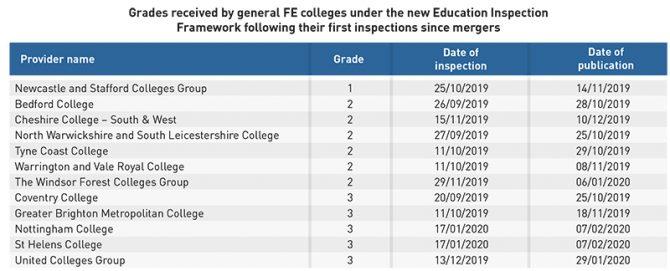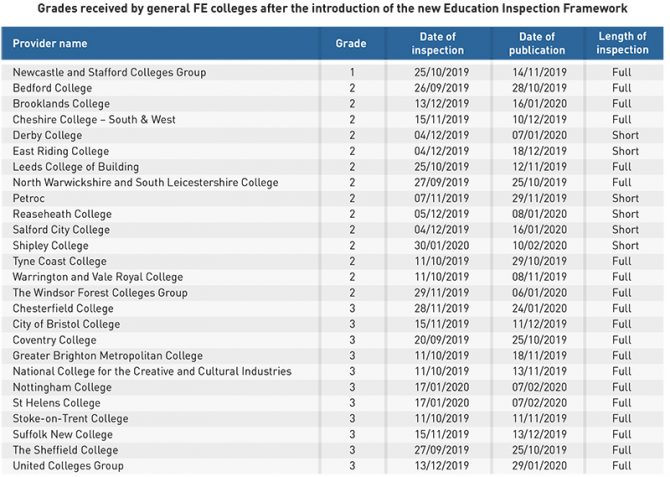More than half of all young learners who enrolled in September at ungraded merged FE colleges now find themselves studying at Ofsted grade three providers.
FE Week analysed the performance of these mega-colleges ahead of the imminent publication of a grade three report for Capital City College Group (see here for full story).
In total, 13 college groups have been inspected for the first time since being formed and following the introduction of the Education Inspection Framework (EIF) in September.
According to Education and Skills Funding Agency data for 2019-20, these providers educate 52,293 young people aged 16 to 18, of whom 27,996 (54 per cent) are now at the six colleges who have been hit with grade threes.
Of the six, nine pre-merged colleges have now lost ‘good’ ratings, while four individual colleges failed to improve their grade threes.
Nottingham College, created after a merger between ‘good’ providers New College Nottingham and Central College Nottingham in 2017, is one group that now ‘requires improvement’.
Inspectors reported that governors, who do not have enough impact on the quality of education, had focused on “resolving the challenges created” by the merger.
United Colleges Group also lost the College of North West London’s and City of Westminster College’s ‘good’ ratings following its merger in 2017.
The education watchdog found that “a significant number of senior staff left” after this.
It added that there had been disruption to specific courses and the management of these was “not yet effective enough”.
However, the report did acknowledge that governors had taken effective action to set up a new leadership team following the merger.
In addition, Greater Brighton Metropolitan College, which formed in 2017 after the merger of Northbrook College and City College Brighton and Hove, both of which were rated ‘good’, received a grade three.

Framework following their first inspections since mergers – click to enlarge
Moreover, both Coventry College and St Helens College failed to improve upon their pre-merger ratings.
Henley College Coventry and City College Coventry were both rated grade three before joining to become Coventry College in 2017.
Inspectors stated that, since the merger, governors “recognised quickly that leaders’ planned improvements were ineffective and took decisive steps with the leadership of the college” and the chair and chief executive had also appointed new governors with “a strong background in education to enhance the board’s effectiveness”.
Similarly, St Helens College was formed in 2017 after a merger between St Helens College and Knowsley Community College, which both had ‘requires improvement’.
Ofsted said the interim principal had begun to stabilise the college following the merger and extensive changes to staffing and college structures.
It added that while new senior leaders have a clear strategic direction, the appointment of a permanent principal had not been finalised and the lack of stability “has had a negative impact on the pace of improvement”.
There have been success stories for merged colleges under the new EIF.
Since it came into force, there has been one ‘outstanding’ rating and six grade twos for these colleges, which deliver provision to 24,297 16- to 18-year-old students in total.
College groups struggling to shine as Ofsted visits for first time Newcastle and Stafford Colleges Group boosted its grade from pre-merger ratings of ‘good’ for Newcastleunder-Lyme College and ‘inadequate’ for Stafford College to ‘outstanding’ in November.
Inspectors praised its leaders and managers for “very effectively” bringing about the merger and “rapidly” integrating the two campuses.
In addition, six other merged colleges are now considered ‘good’.
Grade two provider South Cheshire College had merged with West Cheshire College, a grade three provider, to form Cheshire College – South & West in 2017.
Its governors were praised by the education watchdog for continuing to “secure improvements to the quality of education that learners and apprentices receive during the merger process”.
Tyne Coast College retained the grade two rating obtained by both South Tyneside College and Tyne Metropolitan College after they merged in 2017.
Inspectors believed governors and senior leaders at the college managed the merger “very effectively” and ensured that the college campuses “continue to serve their communities well”.
The Windsor Forest Colleges Group was created in 2017 after ‘good’ Strode’s College merged with East Berkshire College, which had received a grade three.
Ofsted said that governors and senior leaders had ensured they continued to serve their local communities “well, with a broad and relevant curriculum offer” since the merger, with leaders and managers working with local employers and partners to plan and review provision so that it was “focused on current industry practices”.
Moreover, Warrington and Vale Royal College, which formed in 2017, improved its pre-merged college grades.
North Warwickshire and South Leicestershire College retained North Warwickshire and Hinckley College’s and South Leicestershire College’s ‘good’ ratings after the two merged in 2016 and a further grade two was received by Bedford College.
In total, 27 general FE colleges have been inspected so far under the EIF, including CCCG’s verdict.
FE Week analysis shows that more than two-fifths (12) of these have been hit by grade threes.
One provider was declared ‘outstanding’, while more than half (14) were considered ‘good’.
None has been found to be ‘inadequate’.









Your thoughts